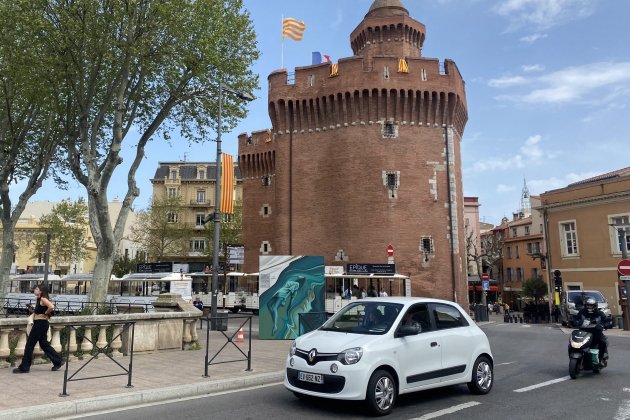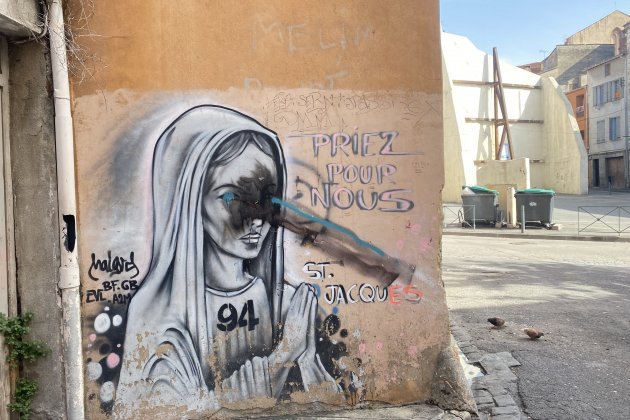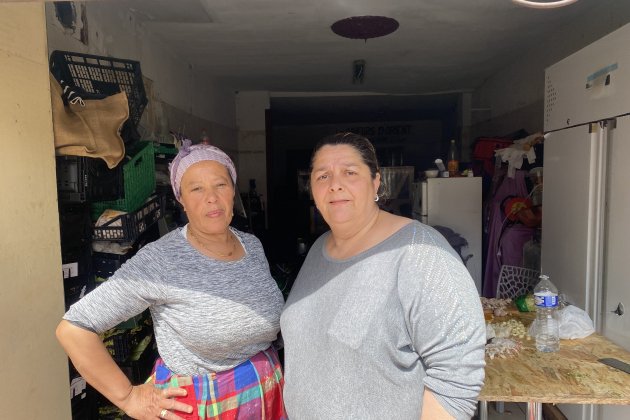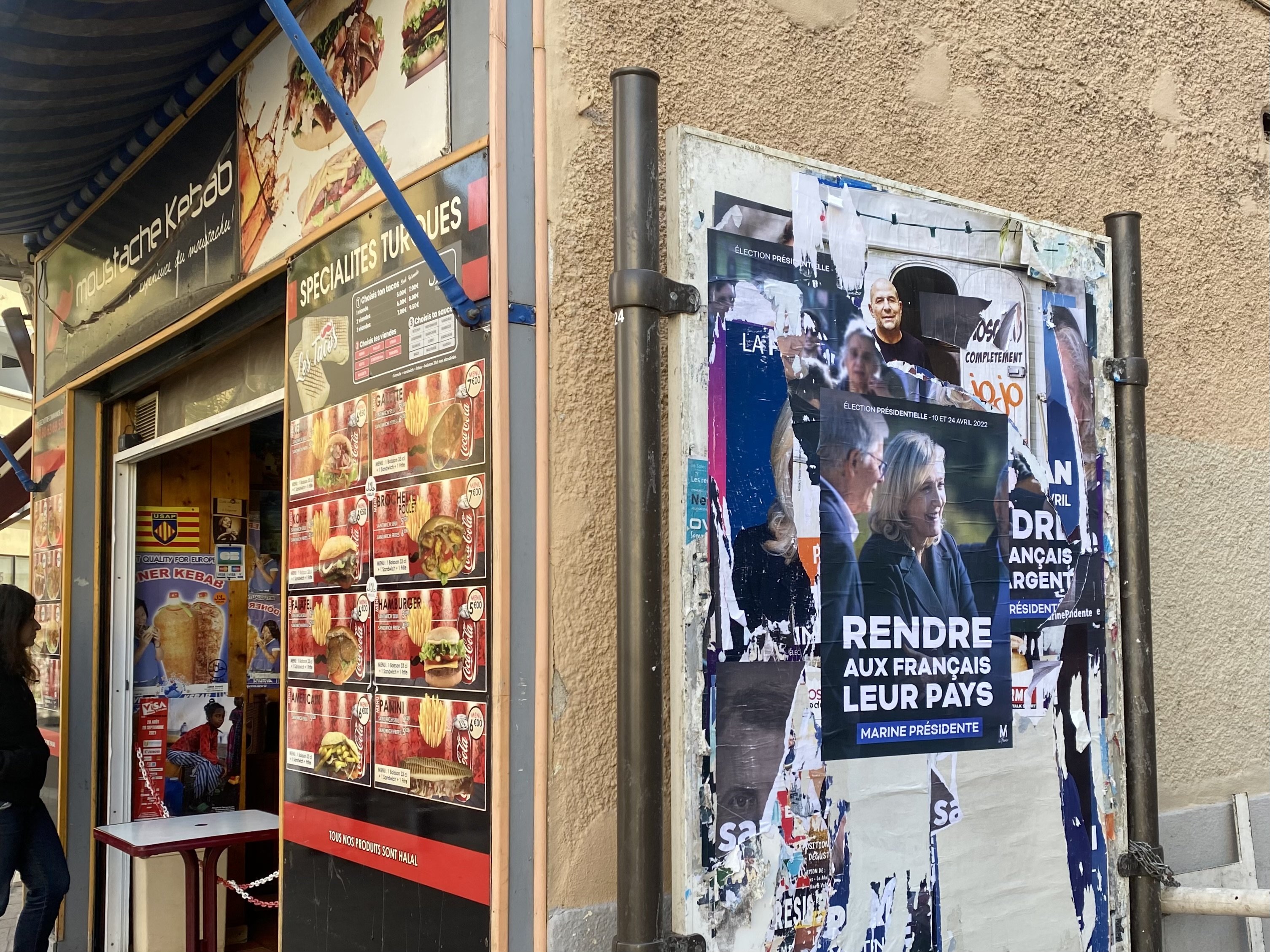Is it possible for someone with Roma and Catalan heritage to vote for a xenophobic and nationalist French party like the Rassemblement National - that is, Marine Le Pen's National Rally? Everything is possible in Perpinyà, as confirmed by Toni, a Catalan Roma from the city's Sant Jaume neighbourhood. "There are many people like that!", he certifies from the terrace of the Cafè Floreal, on Plaça Josep Cassanyes. He is reluctant to give his opinion on Marine Le Pen, having backed a winning horse (“Macron, Macron!”); but he raises his thumb in affirmation when asked about Louis Aliot, the far-right mayor of Perpinyà (Perpignan, of course, in the language of the Republic). With 120,000 inhabitants, the city is the largest municipality ruled by the French far right. It was a clearly calculated move when the candidate decided to close her campaign for the first round of presidential voting in the capital of northern Catalonia.
It is symptomatic: the southern French region of Occitanie and the department of Pyrénées-Orientales (in effect, Northern Catalonia) are historically the farthest-left territories in the whole of France. But in June 2020, in the midst of a pandemic, Louis Aliot, formerly in a relationship with Marine Le Pen, consummated the assault and became mayor of the city, gaining 53% of the vote in the second round. He bumped the mayor of Besiers, Robert Menard, off top position on the podium of the largest French cities ruled by the far right. And on Sunday, April 10th, the whole map, not only Perpinyà (27.3%) but the Pyrénées-Orientales department (32.7%) and the Occitanie region (24.6%) turned black, the black of the lepénistes. The same in towns symbolic to Catalans like Elna (36.7%) and Argelers (32.6%).
With 120,000 inhabitants, Perpinyà is the largest city ruled by the French far right
Spring has arrived and the election cycle has not ended, but rather will culminate in June with the legislative elections. It's easy to overhear lively conversations on the terraces of the cafés in the centre of Perpinyà on what will happen. "With all that has been said about her, and with all the calls to blockade her, it is a miracle that she has got as far as here she has," says an elderly woman. "That's so true," replies her daughter. To the point that they believe a change is possible.
Marine Le Pen's connection with the city of Perpinyà has been very close for many years. Especially as a result of her relationship with Louis Aliot, now spokesperson for her presidential campaign. To the point, as the sociologist Gautier Sabrià points out, that she has won the sympathy of its people in an enclave far away from Paris, which is not used to seeing "the Paris politicians". On the other hand, Sabrià counters, "it is relatively common to find Marine Le Pent having a coffee, or out for a walk, like any other resident".

The personal factor can help a lot, but Perpinyà has all the ingredients to be an explosive cocktail. It is one of the poorest cities in France: before the pandemic, 32% of its population lived below the poverty line. It is also one of the territories hardest hit by unemployment: official figures for the end of 2021 said that 13% were jobless, one of the highest figures in the country, when in much of France the percentage is between 4 and 6%. And it is a city that has seen traditional politicians pass through without resolving anything. The Alduy clan shared power for fifty years: father Paul Alduy from 1959 to 1993 and son Jean-Paul Alduy from 1993 to 2009. They were succeeded by Jean-Marc Pujol, also from the traditional right and also accused of clientelism, who ended up paving the way for the extremists.
Pablo Bonat: "They tried everything and it didn't work. Not the traditional right in the city council nor the left in the department"
Pablo Bonat arrived in Perpinyà nine years ago from Barcelona and has been able to grasp its evolution over the last decade. This Catalan teacher at a public secondary school points out several factors to explain the strength of the far right in the city. On the one hand, fatigue with traditional politicians. "They tried everything and it didn't work. Not the traditional right in the city council nor the left in the department", he states. On the other hand, the fact that it is an "enclave", which can even be traced back to the Treaty of the Pyrenees, and until now has been an "abandoned, left-behind and isolated territory" that has ended up too far from Paris. If in addition to this, the statistics for poverty and precariousness are added, concludes Bonat, the Rassemblement National has a lot of room to move, as we have seen.
In a similar vein is the diagnosis of Gautier Sabrià, a specialist in the far right. "There is a France-wide effect: the popular classes are moving to the extreme right. And, when it comes to precariousness, there is no better example than Northern Catalonia", says this sociologist from Perpinyà. He added that Perpinyà has become a "test bed" for Marine Le Pen, where she has put in a lot of effort and has been able to evaluate her new "de-demonization" strategy. In the same way as the far-right's presidential candidate is seen now, the current mayor also came to power by his closeness to people - he was not the typical candidate sent from Paris - and by centring his discourse on economic and social issues. And also playing with Catalan-ness, with the folkloric question, as when he promised that the first municipal council session would be bilingual, in French and Catalan. It was a false promise - the meeting ended up being exclusively in French and he has persecuted initiatives supporting Catalan - but it allowed him to make further inroads: despite the highest-ever abstention, the National Rally was the leading force in Corsica in the first round, with 28.5% of the vote. "Perpinyà has been a test bed and a success for the far right", sums up Sabrià. Both he and Bonat also state that there has been no organized citizen opposition that has stood up to him; that everyone looked towards their own "circles".
Has anything changed with the far right in power? According to Gautier Sabrià, very little. "The first months were marked by Covid and lockdowns. Then I didn't see much difference", admits the sociologist. Maybe in the police presence, he suggests. In fact, before this conversation in Plaça Cassanyes, there was a raid on an apartment. Around twenty officers arrived. Pablo Bonat points out that one thing has changed: communication. "They communicate everything they do. And all the time they are appearing at social gatherings in Paris. It gives the appearance that Perpinyà is up to something in Paris", explains the professor.
Gautier Sabrià: "Perpinyà has been a test bed and a success for the far right"
And that seems to be enough. The residents of Perpinyà see that it has not been the disaster that the rest of the politicians warned about, but rather they have done as their predecessors did and even had a greater impact on issues such as law and order. Some say they will vote for Marine Le Pen and many others prefer to keep their intention to themselves. But the Perpinyà test bed has normalized the presence of the far right.

Paradigmatic
In Plaça del Puig you can even hear a rooster crowing. And that's despite the fact that Sant Jaume is a central district in a sizeable city. But it has not completely lost its essence: life on the street, children playing until the small hours, the smells… and the aspects that are not so romantic, like the dirt and drugs. It has been described as a “ghetto” by the press and all the measurements of misery confirm that: France’s highest poverty rate, 80% unemployment, school truancy in similar figures… Degradation is seen in its buildings, many supported by huge steel beams, which mostly - not always - keep them standing. Sant Jaume is also the neighborhood of the "Catalan Roma" and for the last few decades, also of the Maghrebis, which has caused conflict. And it is a paradigmatic district for the far right in Perpinyà, where even the gypsies can help elevate someone like Louis Alliot to mayor.
It happened in 2017 in the presidential elections and in 2020 in the municipal elections. Out front, campaigning, was Alain Jiménez, also known as Nounours ("teddy bear"), an important representative of the Catalan Roma community in Perpinyà. He was fully involved, and mobilized the vote for the far right, from people who were fed up with the traditional parties, with the misery and - to put it bluntly - with the Maghrebi community. He was even hired by the new city council, but he rebelled when he saw that their policy in Sant Jaume was the same as that of their predecessors. "I said they were a fraud and three days later I was on the street," he says.
Jiménez: "Between Macron and Le Pen, there is no doubt. She gives us more benefits. He is against the poor"
In the first round this year he campaigned for Mélenchon ("he had to win, he had to win"), and in fact he won in the neighborhood on Sunday, April 10th. But, for this Sunday, Alain Jiménez will be starting again at square one: "If Marine does things right, I'd prefer her. Between Macron and her, I have no doubt. For us, she has more advantages. He couldn't be any worse. He has murdered the hospitals, the people, the old people… He has killed everything. He's a criminal." He adds that he doesn't particularly "like" Le Pen, but he doesn't regret what he did.
Nounours is not concerned about the National Rally being a far-right party with accusations of racism. “Racist… it is racist with the bad guys. Not with us, quiet people." And immediately he puts that into his campaign against the current President of the Republic: "We would rather be accused of being racists than have an impossible life. Macron goes against the poor."

At the antipodes of this point of view is Louisa Bengueddache, of Algerian origin. She says she speaks a little Catalan "because she grew up in Sant Jaume", but she won't dare try right now. She is in a bar, with other residents, giving out food. They prepare between 400 and 450 meals a day. "Come at night, the poverty here is terrible," she laments. They make no distinctions: "Everyone comes to us here and we take care of them of all: French, Algerians, Moroccans, Roma… Everyone." The same cannot be said of politicians, who are "favouritist" according to origins. Nor of the ambience that has been created: "If you are French, they look at you one way, and if you are Algerian, like me, another. But I'm French too, eh?”
Despite the "favouritism" and "stigmatization", she is able to see good things in Louis Aliot, who has "got to work", "cleaned up" and "there are more police, which does not concern us". She also understands that her neighbours may end up voting for Marine Le Pen: "People are fed up. Especially over purchasing power. Now a bottle of oil costs four euros. Four euros! People are fighting for themselves because they don't have enough to live."
Louisa has always been very involved politically. She remembers how even president François Hollande received her. In the first round she voted for and told people to vote for Jean-Luc Mélenchon, to get rid of Marine Le Pen. "I almost did it," she says with a laugh. And in the second round she is also clear: "Have you written down that Macron's going to win?", she wanted to check. It remains to be seen whether her neighbours think the same. Everything seems to indicate that they do not.

